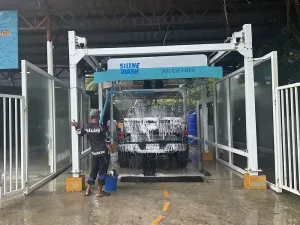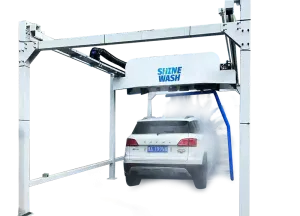It is automatic car wash that clean vehicles without utilizing typical brushes or bristles. Instead, it uses high-pressure water jets and specific detergents to remove dirt and grime from the vehicle’s surface. This procedure is intended to avoid scratches or damage to the paint, making it a safer choice for fragile or high-end finishes. Also known as touchless car washes, it can avoid direct contact with the vehicle during the cleaning process.

This kind of car wash machine uses high-pressure water jets and carefully formulated detergents to clean your vehicle without requiring physical contact. Here’s a step-by-step explanation of the procedure:
The pre-soak phase involves spraying the vehicle with a detergent solution to loosen dirt, grime, and other impurities.
High-Pressure Rinse: Powerful water jets remove dirt and detergent from the car’s surface.
During the drying phase, excess water is removed from the car using air blowers or drying chemicals.
This touchless method is gentle on your car’s paint and decreases the likelihood of scratches, making it a popular alternative for maintaining the outside finish.
No, it’s not bad for your car. In fact, they are often safer for your vehicle’s paint compared to traditional car washes with brushes. Since brushless systems use high-pressure water and cleaning agents without physically touching the car, they significantly reduce the risk of scratches, swirl marks, or paint damage.

However, they may not clean heavily soiled vehicles as effectively as traditional methods, and some aggressive chemicals could wear down the car’s finish over time if used frequently. Overall, they are a safe and convenient option for most vehicles.
Brushless car wash systems offer several strategic benefits for business owners seeking higher efficiency, lower operational risks, and improved customer satisfaction. Compared with traditional brush-based systems, a brushless setup can deliver long-term value while enhancing service quality.
Because brushless systems do not use physical brushes, the risk of paint scratches or swirl marks is significantly reduced. This minimizes customer disputes and protects your brand reputation, especially when serving owners of luxury or premium vehicles.
Traditional brushes require frequent replacement and maintenance due to wear and tear. Brushless car washes eliminate these consumables, helping operators reduce recurring expenses and simplify long-term machine upkeep.
Brushless car wash cycles are typically faster, enabling operators to serve more vehicles during peak hours. Increased throughput translates into higher daily revenue without requiring additional labor.

Automated chemical application and high-pressure water jets provide predictable, repeatable cleaning results. This consistency helps operators maintain customer satisfaction and build strong retention rates.
Because brushless technology is perceived as gentler and safer, car wash owners can position their service as a premium, paint-safe solution. This allows for better pricing strategies and improved margins.
Many brushless systems use less water and incorporate eco-friendly detergents, helping businesses reduce utility costs and appeal to environmentally conscious customers.

When it comes to car washing, choosing between a brushless and a traditional car wash can significantly impact your vehicle’s appearance and longevity. Each method has its unique advantages and disadvantages.
Better for the Environment: Contactless car wash typically use less water than traditional washes and often employ biodegradable cleaning agents, making them a more eco-friendly choice.
Easier on the Wallet: While the upfront cost may vary, car wash machines with no brushes can save money in the long run by reducing the likelihood of scratches and paint damage that may require costly repairs.
Faster Than Most Methods: Brushless systems are generally quicker, with many washes completed in under 10 minutes, making them ideal for busy schedules.
Doesn’t Damage the Vehicle: Without physical brushes that can scratch the surface, non-brush car wash systems provide a gentler clean, which is particularly beneficial for vehicles with delicate paint finishes.
Doesn’t Clean Your Vehicle Completely: While effective for light dirt, brushless car washes may struggle with heavy grime or mud, which might require additional cleaning.
Drying Methods Aren’t as Effective: The drying process may not be as thorough as traditional methods, potentially leaving water spots on the vehicle.
Excessive Chemical Use: Some brushless systems rely heavily on chemical detergents, which may not be ideal for all vehicles and could affect sensitive finishes over time.
Risk of Scratches: Although the risk is lower, there’s still a possibility of scratches if dirt particles are not adequately removed before the wash.
Thorough Cleaning: Traditional car washes can provide a deeper clean, especially for heavily soiled vehicles, as they often use brushes to remove stubborn dirt and grime effectively.
Better Drying Options: Many traditional washes have robust drying systems, which can leave your vehicle spotless without water spots.
Customization: Traditional car washes often offer more customizable options, including hand washes and detailing services that can address specific cleaning needs.
Risk of Damage: The brushes used in traditional washes can cause scratches, swirl marks, or other damage, particularly to sensitive paint finishes.
Longer Wait Times: Traditional car washes may take longer due to the manual process and thorough cleaning required.
Higher Water Usage: These methods generally consume more water compared to brushless systems, which may be a concern for environmentally conscious consumers.
| Aspect | Brushless Car Wash | Traditional Car Wash |
| Cleaning Method | High-pressure water jets and chemicals, no physical contact | Brushes or cloths used to scrub the vehicle’s surface |
| Risk of Scratches | Low, as there is no contact with the vehicle | Higher, due to potential abrasive action from brushes |
| Thoroughness | May not remove heavy dirt and grime as effectively | More thorough cleaning, especially for stubborn dirt |
| Time Efficiency | Typically faster | Slower due to manual scrubbing and drying |
| Environmental Impact | Often more eco-friendly, uses less water | May use more water and energy, depending on the system |
| Chemical Usage | Heavily reliant on strong detergents | Typically uses less aggressive chemicals |
| Vehicle Suitability | Ideal for luxury, high-end, or delicate paint finishes | Suitable for all vehicles but may cause wear over time |
| Drying Method | Air drying, less effective (may leave water spots) | Manual or blower drying, generally more effective |
| Cost | Often cheaper in the long term due to reduced paint damage | May cost more over time due to potential paint repairs |
A touchless car wash eliminates any physical contact between the cleaning equipment and your vehicle. The technology completely relies on high-pressure water jets and chemical detergents to remove dirt, grime, and pollutants from the car’s exterior.
Step 1: The car is sprayed with powerful cleaning agents that help break down dirt and contaminants.
Step 2: High-pressure water jets blast away the loosened dirt without ever touching the vehicle’s surface.
Step 3: The vehicle is air-dried, or drying agents are used to remove water from the car.
No Risk of Scratches: Since no physical contact is made with the car, there’s virtually no chance of scratches or swirl marks.
Safe for All Paint Types: It’s particularly safe for cars with sensitive or damaged paint.
Faster Process: Touchless car washes are usually very quick, often taking less than 10 minutes.
Less Thorough Cleaning: Touchless systems may struggle with removing tough grime, mud, or other stubborn debris.
Heavy Chemical Use: To compensate for the lack of physical contact, strong chemicals are often used, which might not be ideal for the long-term health of your car’s paint.
A car wash machine with no brushes also avoids traditional brushes, instead using soft cloth strips or foam pads in conjunction with water jets and cleaning compounds to wash the vehicle. While it is commonly described to as touchless, some brushless systems do allow soft objects to softly touch the car.

For Paint Protection: If you want to avoid contact with your car’s surface, a touchless car wash is the best alternative because it cleans with only water and chemicals.
For Deeper Cleaning: If you require a more thorough cleaning, particularly for tenacious grime, a brushless car wash may be more effective due to the mix of water jets and soft towels.
For Fast Cleaning: Both processes are rather quick, however touchless washes may be somewhat faster due to the lack of physical cleaning tools.
Yes, they are generally safer than traditional car washes because they avoid physical contact with the car’s surface.
Yes, though they might not be as effective at removing heavy dirt and grime, they are excellent for routine cleaning.
For regular maintenance, once every two weeks is a good rule of thumb, though it depends on how often your car gets dirty.
Yes, most of them are equipped to handle larger vehicles like pickup trucks, but it’s best to confirm with the specific service provider.

Contact Shinewash experts if you are interested in the brushless car wash machine